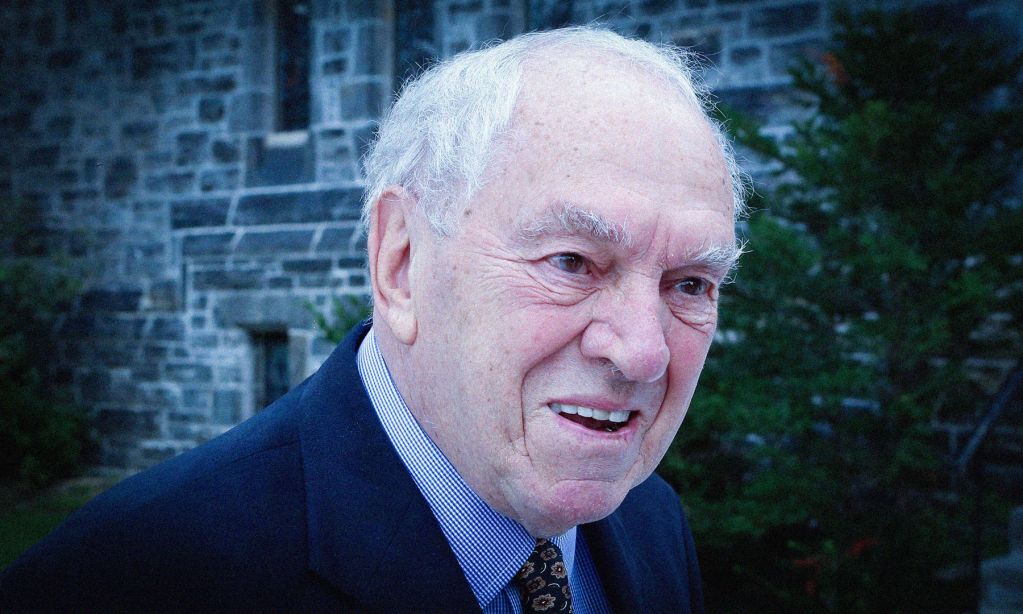Ed Broadbent, a towering figure in the Canadian left, has passed away.
Ed entered the House of Commons in 1968 as a member of parliament (MP) for the working-class riding of Oshawa-Whitby. He became leader of the NDP in 1975, where he remained until his departure in 1989. At Jack Layton’s urging, he returned to parliament as MP for Ottawa Centre in 2004 but stepped down several years later to take care of his wife, Lucille.
I first met Ed following the 1984 election, when I was hired as legislative assistant to the newly elected MP Steven Langdon, who was appointed as NDP the industry and trade critic. Steven had been my thesis supervisor at Carleton University. I became one of the go-to experts on the Mulroney government’s free trade negotiations with the Reagan administration. The FTA was a key pillar of the march down the neoliberal highway. I often briefed Ed—he preferred to be called Ed rather than any of the elevated titles that he could have assumed—on the status of the negotiations and related trade and investment issues.
These were heady times for a young policy wonk who lucked into the epicentre of political debates, working for the iconic leader who opposed the War Measures Act and helped patriate the constitution and shape the Canadian Charter of Rights and Freedoms. I had to pinch myself more than once.
I admired Ed’s ability to connect with people, avoiding jargon and clichés, whether in question period or addressing his constituents—rare for a former university professor. His sense of humour was captured in the piece for This Hour has 22 Minutes posted by Mark Critch.
Ed was very clear about wanting to be prime minister, but he was equally clear about not compromising one’s principles in the pursuit of power. This tension was perhaps best encapsulated in his recently published book, Seeking Social Democracy, in which he writes:
“To champion a socialist vision in a capitalist world is, in a sense, a strangely paradoxical act of faith: unless you are prepared to lose majorities you will compromise your core beliefs, but to act on the basis of belief or program alone, without regard for the feelings and commitments of the majority in society, does both a profound disservice.”
His understanding of power also underpinned his steadfast advocacy for labour unions and collective bargaining as a countervailing force to the power of private wealth and government.
My departure from the NDP in 1989 coincided with Ed stepping down as leader after the free trade election, even though he had built the caucus to record 43 members—surpassed only by Jack Layton, who raised the NDP to official opposition status with 103 seats in 2011.
After a brief stint at Canadian Labour Congress, I went on to be the Canadian Centre for Policy Alternatives’ first research fellow and its executive director from January1994 to the end of 2015. I crossed paths with Ed from time to time at public events, volunteering during his Ottawa Centre election campaign.
Ed’s voice continued to inspire me as I helped build the CCPA as an independent progressive policy research organization devoted to advancing the public good with a vision of social, economic, and environmental justice.
The CCPA was emphatically not a political party partisan. We saw ourselves as policy partisans regardless of parties. One memorable example: The Harper Conservative government—not an ally by any stretch—adopted a recommendation of the centre’s Alternative Federal Budget (AFB) to create an independent Parliamentary Budgetary Office (PBO). The same Harper government later tried to remove our charitable status.
A senior NDP politician asked me to run as a candidate during the 2011 election. I declined because I thought at the time my chances of winning the seat were slim and my return to the CCPA would compromise its independence. In retrospect, the Layton orange wave became a what-if moment for me.
In recent years, I and several former colleagues would meet up with Ed once or twice a year for lunch. We congregated mostly at the famous Chez Lucien pub located in the ByWard market area of Ottawa.
His intellect and passion for justice—his understanding of the threat from unprecedented income and wealth inequality, expanding authoritarianism, right-wing extremism, and the climate crisis facing the planet remained razor sharp. So, too, did his humility, kindness, and interest in our lives.
At our last gathering, in the spring of 2023, he had completed his part of the Seeking Social Democracy transcript. The book was released last October. I was very much looking forward to having him sign my copy at our next lunch.
Rachel Notley, in her tribute, referred to Ed as embodying the “perfect combination of ethics, intellect, empathy and authentic connection with—and concern for—regular Canadians,"
Ed made a point of never demonizing his political opponents. He built bridges and always saw the benefit of seeing problems from multiple angles.
I am privileged to have known and worked for Ed Broadbent. He stands among the great political leaders in Canada’s history, the kind of leader we want and need.
We will miss you, Ed. Your memory will live on, inspiring us in our ongoing fight for justice.
There will be a state funeral—an honour reserved for the most eminent Canadians—for Ed Broadbent on Jan. 28. Details will be released in the coming days.







